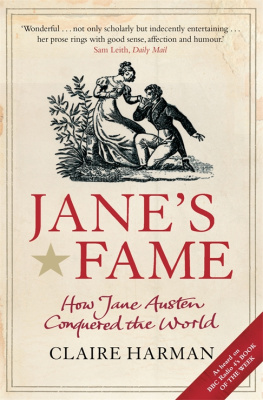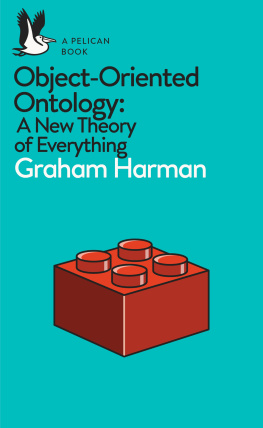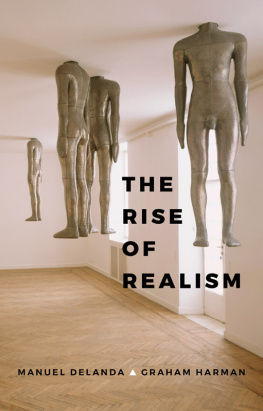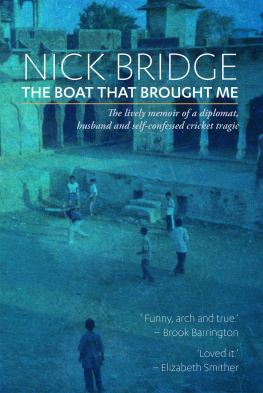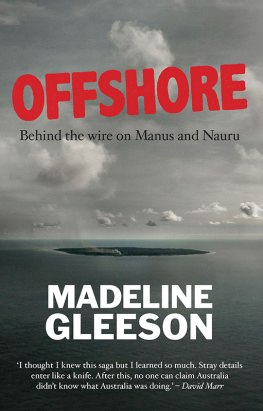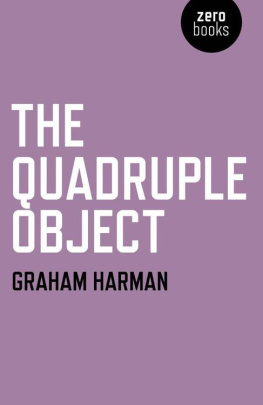Harman - Circus Philosophicus
Here you can read online Harman - Circus Philosophicus full text of the book (entire story) in english for free. Download pdf and epub, get meaning, cover and reviews about this ebook. City: Lanham;MD;Washington;USA;Winchester;UK, year: 2010, publisher: O-Books;Distribution in USA [by] NBN, O Books, genre: Romance novel. Description of the work, (preface) as well as reviews are available. Best literature library LitArk.com created for fans of good reading and offers a wide selection of genres:
Romance novel
Science fiction
Adventure
Detective
Science
History
Home and family
Prose
Art
Politics
Computer
Non-fiction
Religion
Business
Children
Humor
Choose a favorite category and find really read worthwhile books. Enjoy immersion in the world of imagination, feel the emotions of the characters or learn something new for yourself, make an fascinating discovery.

- Book:Circus Philosophicus
- Author:
- Publisher:O-Books;Distribution in USA [by] NBN, O Books
- Genre:
- Year:2010
- City:Lanham;MD;Washington;USA;Winchester;UK
- Rating:5 / 5
- Favourites:Add to favourites
- Your mark:
- 100
- 1
- 2
- 3
- 4
- 5
Circus Philosophicus: summary, description and annotation
We offer to read an annotation, description, summary or preface (depends on what the author of the book "Circus Philosophicus" wrote himself). If you haven't found the necessary information about the book — write in the comments, we will try to find it.
Circus Philosophicus — read online for free the complete book (whole text) full work
Below is the text of the book, divided by pages. System saving the place of the last page read, allows you to conveniently read the book "Circus Philosophicus" online for free, without having to search again every time where you left off. Put a bookmark, and you can go to the page where you finished reading at any time.
Font size:
Interval:
Bookmark:
This book was written slowly, but published with surprising speed. The story of its publication began with a visit to a Chicago literary agent, a barrel-chested hustler with a reputation for shepherding unorthodox works into print. Acting on the advice of Professor Michael Witmore (Univ. of Wisconsin) I attended the meeting accompanied by my three most colorful friends: a surrealist, a Zen monk, and a telepath. The first was a foppish Belgian with a waxed moustache, generally clad in the smock of a mime and a corduroy hat, met by chance one summer at St. Xaviers tomb in Goa. The monk was a Japanese acquaintance (and my cousin by marriage) who had taught me the rudiments of meditation during a period of personal crisis. The telepath was a stranger hired for a ridiculous birthday prank some months earlier, but had performed so brilliantly on that occasion that he was quickly admitted to our closest circle of friends. On a late morning in February, we all trudged together through the slush of the South Loop to a structure designed by Burnham and Root themselves, and took the rickety elevator to one of the middle floors of the building. It was a Saturday afternoon; the hallways were empty, but the door we sought was already open.
The agent pointed needlessly to the armchairs and couches spread before his desk, and we were quickly seated. Chomping on a cigar, he glanced at the manila envelope under my arm and asked brusquely what it contained. After some hesitation and fumbling, I explained that it was a book of metaphysics in the long-abandoned style of Platonic myth, set in a decayed industrial infrastructure, and based on genuine stories from my travel diaries. The agent shook his head before my last sentence was finished: I dont do metaphysics no market. Anyway, Platonic myth has no future. And that infrastructure genre only works anymore for horror ... or pornography. He made the latter point with an unwelcome chuckle, but our innocent confusion on the topic left him troubled, and he continued in a more upstanding spirit: I suppose this sort of thing could go over well in Central Europe, if you handled it just right. But not the American readership. And for travel books the markets always a bit saturated. But Im not doing anything else, and its wet outside. So lets hear it. Whatve you got? My prepared response went roughly as follows:
First is the description of a gigantic ferris wheel of many miles in diameter. It carries numerous objects in a long arc above the ground before sweeping them under the earth, past various chambers filled with objects ranging from the benign to the deadly. By considering the varied interplay between the objects in the wheel and the fixed entities that they pass, we are led to reject the present-day trend of abandoning individual substance in favor of events and relations. This imaginary wheel mightiest monument in the history of the earth! has great value for the philosophy of the twenty-first century. For through its example we are led to revive a metaphysics of objects.
Second, I tell of an encounter with a dear friend in Annapolis shortly before her unexplained disappearance. Her philosophical position was of the Deleuze-Simondon variety, though the present book mentions this only in passing. More relevant here is the myth I invented to counter her objections. Spanning the Chesapeake Bay near Annapolis one finds a long and towering bridge, a marvel of engineering. My friend knew the bridge well enough: although a wealthy foreigner, she was born and raised within sight of it. Yet my story placed it in a context she could never have expected. Imagine numerous individuals standing on the bridge and throwing assorted objects into the bay, through emotional disturbance or some other reason. Imagine further that the bridge is transposed to the depths of Hell, where the legion of pre-Socratic thinkers is called upon to justify their theories in a series of rapid show trials, all of them failing and therefore punished by death. In this way my friends metaphysical theories are gradually refuted, in favor of one where individual things regain their classical privilege, though in weirder form than the realisms of yesteryear.
In Chapter Three I pay tribute to the odd Leibnizian doctrine of tiny animals: those minuscule bodies that remain attached to monads following the death of the visible creatures they animate. If we shift the image from animals to calliopes (or some other musical instrument) a myth takes shape to explain the fourfold structure of objects. But the choice of a calliope as my example was the work of chance: I simply happened to encounter such a machine one evening on the beach in Chennai, formerly known as Madras. And it was on that very day that I had been reflecting most seriously on the problems of Leibnizian metaphysics.
Fourth, I find myself on a lonely offshore drilling platform in the Gulf of Mexico with a young English literary celebrity, through a series of events recounted briefly at the start of the chapter. In this desolate location, far from the mainland and in dangerous weather, I pass the time with my friend reflecting on three key features of causation, after some initial verbal sparring that I admit does credit to neither of us.
The fifth chapter depicts a haunted boat. This story comes purely from imagination, without basis in my travels, except that it first came to mind on a ferry ride from Hiroshima to Matsuyama. Hence the myth has a strongly Japanese flavor. The example of the boat is used to explain my conception of allure, in which objects are torn apart from their own qualities. In my theory allure is the basis not only of aesthetic experience, but of physical causation as well, though the myth can only hint at the full scope of the problem.
In the final chapter, I recount a theory of relationless entities sparked by debate with the French philosopher Bruno Latour. The discussion occurred some years ago, just prior to a devastating hailstorm in Paris, and was interrupted early by outside factors. Taking slight liberties with chronology, the chapter incorporates my thoughts from a later period about what I call dormant objects. The series of myths thereby comes to a close, and the outlines of a new metaphysical theory is thereby sketched, as proposed.
So far the agent had listened with a thoughtful attention that matched his reputation for mindfulness rather than his unspeakably sloppy appearance. But now came an ecstatic outburst from the man: Jesus! Thats a hell of a manuscript! Whats the working title? By prior arrangement the Belgian surrealist leaned forward, feigning contempt as he sneered: Everyone knows... Mustard. The agent chomped a bit harder on his cigar, but otherwise looked perplexed.
All the while the telepath had been pressing his fingers to his temples, his eyes closed as if lost in some private inner vision. At once a loud crack resounded from the large cabinet in the room, startling the agent without ruffling those of us who had experienced such moments in the telepaths presence before. A few seconds later came another crack from the table, and then a louder but muffled burst from the floor near the center of the room. The rapid series of cracks then ceased, though the larger of the rooms two windows began to rattle gently, and a faint whistling sound could be heard somewhere in the distance.
After a period of visible unease, the agent regained his composure and repeated his question concerning the manuscripts title. At this the Zen monk shouted a Japanese syllable, so meaningless in isolation that I do not record it here. This last gesture finally hit the mark. Whether enlightened by the shout or not, the agent began to laugh: softly and slowly at first, then coughing just a bit as he did so, gradually passing into increasingly heavy laughter, so that finally his face turned bright red. Wishing to encourage him, we all laughed along. After two or three minutes of uproarious mirth, the mood in the room returned to normal. Dropping his cigar stub into an antique ashcan, he practically shouted his next words: Brilliant! Youve got yourself an agent! He then lumbered toward his computer as we all resumed laughing. The agent printed a contract, which I scanned lazily as he and the telepath gathered champagne glasses from a cabinet, while the Zen monk smiled and the surrealist took insolent drags from a hand-rolled clove cigarette. We still had no publisher, but the agent was known to be persuasive, and later events confirmed our assumption that the battle was already won.
Font size:
Interval:
Bookmark:
Similar books «Circus Philosophicus»
Look at similar books to Circus Philosophicus. We have selected literature similar in name and meaning in the hope of providing readers with more options to find new, interesting, not yet read works.
Discussion, reviews of the book Circus Philosophicus and just readers' own opinions. Leave your comments, write what you think about the work, its meaning or the main characters. Specify what exactly you liked and what you didn't like, and why you think so.

